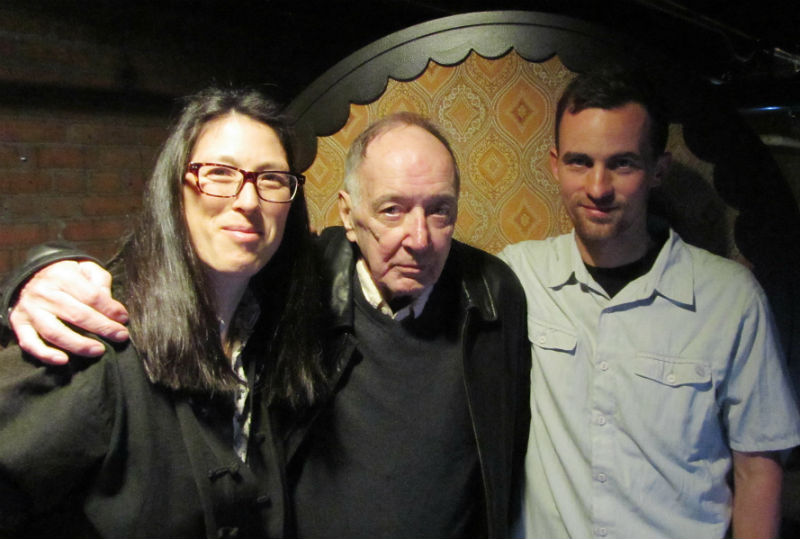Ann Arbor filmmaker Christina Morales Hemenway premieres "Get Real" comedy at the Michigan Theater
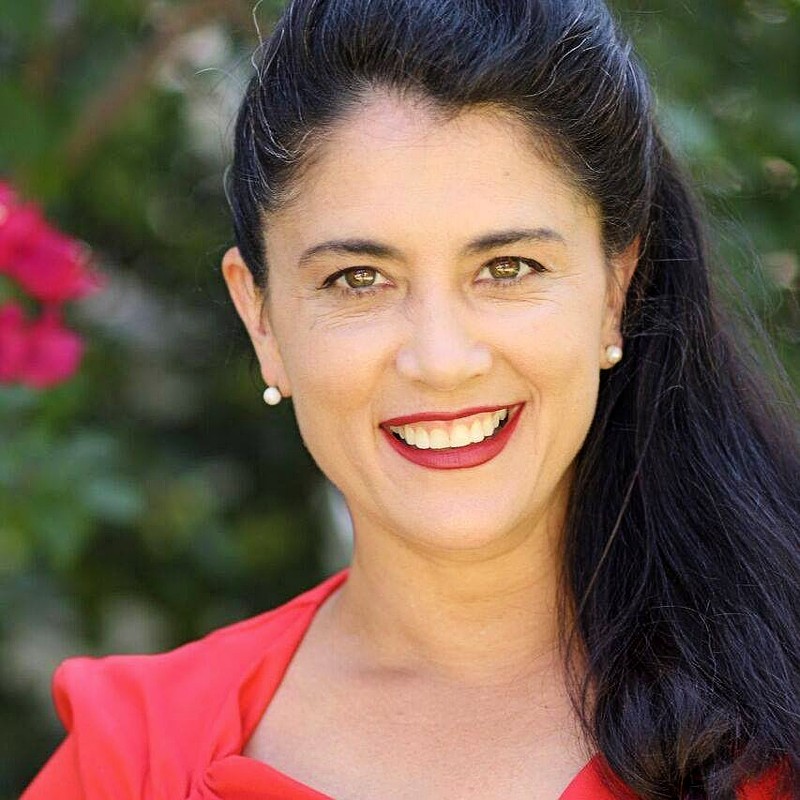
Christina Morales Hemenway got the idea for her new film, Tommy Hollywood and Katie Encino Move to the Midwest to Get Real, in 2005, after she moved back to Michigan following 17 years in Los Angeles.
The Ann Arbor-raised Morales Hemenway—her parents own Elmo's T-Shirts on East Liberty Street—found so much humor in the expansive cultural gap between Left Coast glamor and Midwestern modesty that she wrote a script that ends up lovingly skewering both sides. (The ad line for the film is, "Think Clueless meets Fargo. A mutually offensive comedy.")
Now, nearly 20 years after the initial inspiration, the comedy more commonly called Get Real has its premiere at the Michigan Theatre on Friday, January 5—which is only fitting.
"Russ Collins [executive director] of the Michigan Theater plays the mayor of the small Midwestern town [the characters] end up in," Morales Hemenway says. (Her 2005 film, Dreammaker, also premiered at the Michigan Theater.)
Filmed in Milan, Ann Arbor, and Brighton, the fish-out-of-water comedy pokes fun at our celebrity-obsessed culture. Get Real is Morales' fifth feature outing as a writer-director and it shifts the focus from the romance of her last film, 2019's Bride +1, to satire and tells the tale of two disillusioned "L.A. airheads" who move to a small Michigna town in a last-ditch bid to save their relationship. Actors Chris Daftsios and Joni Allen play the lead roles, and a large part of the rest of the cast is Ann Arbor-area actors—most of whom have never acted before.
Sing Us a Song: The piano men and women of "Duelers" star in a new Michigan-produced film with deep local connections

Duelers Piano Bar is the home of five young musicians who trade keyboard licks and share solace, shots, and sounds on a nightly basis. But the venue that offers them a routine and respite from problems is about to be sold by a money-hungry owner, which will turn their lives upside down.
This is the plot of Duelers, a new movie made by a group of multi-talented Michigan creatives. Writer/composer/co-star Drew De Four, producer / cinematographer Danny Mooney, and their cast of real-life performers straddle the line between a concert film and backstage drama. The film was shot at the now-closed J.D.'s Key Club piano bar in Pontiac, Michigan, taking 12 days over two weeks.
Like his co-stars, De Four is a real dueling pianist, and his talents have taken him around the globe. During shooting, he lived with the actors who play Tyler (Tom McGovern), Jane (Elisa Carlson), Skip (Danny Korzelius), and Bethany (Shelby Winfrey), the multi-talented musicians who share the stage nightly with Drew (De Four) at the fictional Duelers Piano Bar.
De Four, 40, has been playing in piano bars since he was 19. He was a student at Eastern Michigan University when he saw an ad for Pub 13, a dueling pianos bar in Ypsilanti.
"I took five years of piano lessons from ages 7 to 12," De Four says. "From 12 to 18, I taught myself piano, guitar, bass, mandolin—a little bit of drums. When I was 19 I went to Eastern for a year to study piano, and my professor told me I should not be studying classical piano because when I came back from the piano bars asking, 'How do I do stride piano?' He said, 'You could teach me. You seem to know exactly what you want to do. We're studying Rachmaninoff and Liszt: That's not what you're meant for.'"
No Restrictions: Independent Film Festival Ypsilanti returns with a full slate

When Martin Thoburn and Donald Harrison launched the Independent Film Festival Ypsilanti (iFFY) in 2020, they offered cinema fans socially distanced, drive-in-style screenings and a momentary reprieve from the pandemic, which had shuttered movie theaters across the country.
Three years later—and one year after finding a new home at the Riverside Arts Center—iFFY is solidifying its spot on the local film scene with an ambitious scope and schedule, running April 19-23.
"There's also double the amount of programming. An extra day-and-a-half," said Micah Vanderhoof, iFFY operations manager and a University of Michigan alum with a bachelor's degree in screen arts and cultures who previously worked as a programmer for the Portland International Film Festival.
"Michigan-ish," a competitive program of a dozen short films produced in and around the region, kicks off the fest on Wednesday, April 19 at 7:30 pm, followed by an after-party at Ziggy's featuring DJ sets and decorations by House of Jealous Lovers.
A Portrait Study: Ann Arbor Film Festival highlights the Black, queer, experimental cinema of Edward Owens
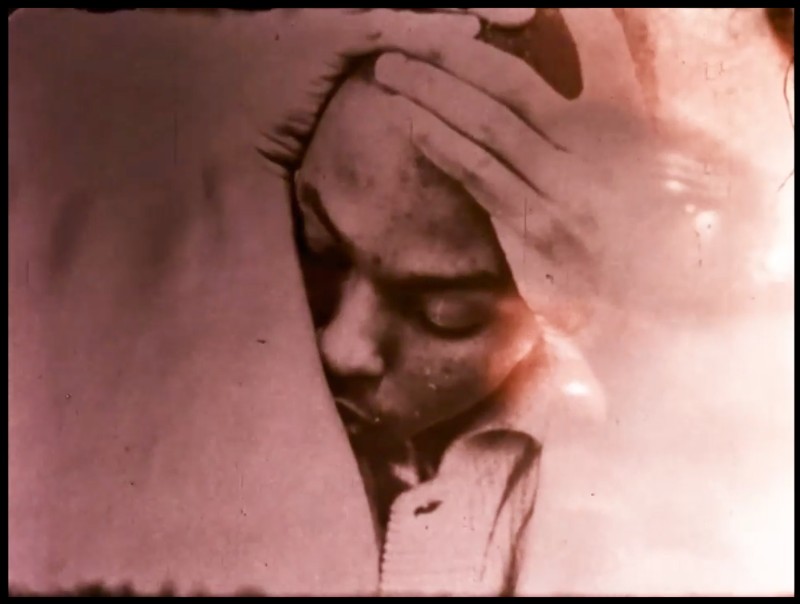
Edward Owens' story may have been lost to history were it not for film programmer, writer, and Bard College professor Ed Halter.
An obscure figure from one of cinema's most elusive realms, Owens was a Black, queer, experimental filmmaker from Chicago whose career was cut tragically short.
In 2009, intrigued by an entry in the Film-Maker's Co-Op catalog about the experimental short Private Imaginings and Narrative Facts, Halter reached out to Owens decades after he left his life in filmmaking behind. Their conversations brought newfound context to Owens' artistic vision, which helped amplify the voice of an artist whose compelling story was at risk of being relegated to obscurity.
Owens' life and limited collection of works is the subject of the 61st Ann Arbor Film Festival (AAFF) program "Remembrance/Vacancy: The Films of Edward Owens" at the State Theatre on Thursday, March 23, 7 pm.
The event offers audiences the rare opportunity of seeing three Owens films back to back: Remembrance: A Portrait Study (1967, 6 min.), Private Imaginings and Narrative Facts (1966, 6 min.), and Tomorrow's Promise (1967, 45 min.).
Following the screenings is a conversation between Emily Martin, who programmed the event, and Jessica Ruffin, an assistant professor in the University of Michigan's Department of Film, Television, and Media.
U-M Computer and Video Game Archive is a place where you can rediscover your past

The clouds were racing overhead as the winds pushed me toward the Duderstadt Center, the imposing Art, Architecture, and Engineering Library on North Campus that is also home to the U-M Computer and Video Game Archive.
Looking up at the towering mouth of the glassy citadel, it's easy to imagine yourself as an avatar on a digital map, an adventurer about to set foot in a new world.
What challenges await inside?
Happy Halaloween: Exploring horror films in the Islamic world
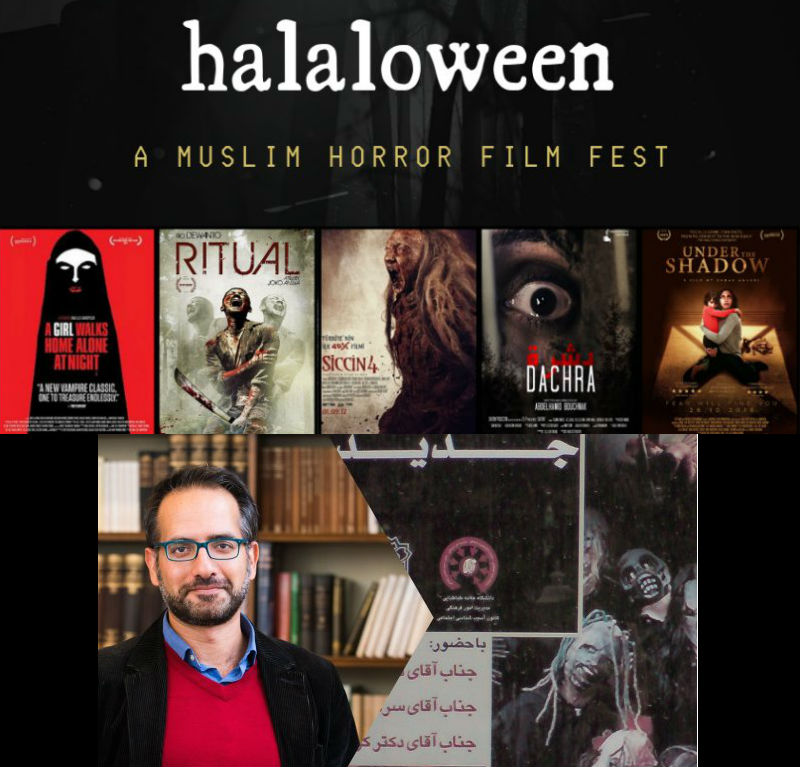
Marlon Brando's Perfecto leather. James Dean's brooding teenage rebellion. Marilyn Monroe's ethereal, platinum blonde beauty.
It's a testament to the power of Hollywood that so few words can summon such vivid 20th-century American iconography.
Even no-frills popcorn fare like The Day After Tomorrow can have "significant impact" on public awareness according to a 2004 Yale study on Climate Change Risk Perception.
But if these pop-culture dreamscapes can embed in the cultures in which they were conceived, what happens when that product is consumed in foreign cultures, especially those with a different majority religion?
Two events at the University of Michigan will explore this question: Dr. Alireza Doostdar, assistant professor of Islamic studies and the anthropology of religion at the University of Chicago Divinity School, will discuss Hollywood Horror in Iran on Tuesday, September 24, at 4 pm in Room 555 of Weiser Hall and U-M's Global Islamic Studies Center and The Michigan Theatre will present Halaloween: A Muslim Horror Film Fest every Tuesday at 9 pm throughout October. Each film is presented free to the public with English subtitles.
Supple Wrists: Vintage Flipper World, aka The Ann Arbor Pinball Museum, preps its quarterly showcase

This story was originally published on April 5, 2017.
Strolling the aisles at Vintage Flipper World, aka The Ann Arbor Pinball Museum, is like talking a walk in time. As cascades of colorful flashing lights fire up your synapses, the frantic medley of familiar themes, playful taunts, and ringing bells transport you to a place where all that matters is keeping that shiny metal ball from slipping between your flippers.
Turn left, and perhaps you'll find yourself standing in front of a vintage game from the 1950s. Or round the corner and prepare to do battle with the Stay-Puft Marshmallow Man on Stern's luminous new "Ghostbusters" machine. Stick around long enough, and eventually you'll cross paths with Clay Harrell, the gruff yet not-unapproachable proprietor of this wedge-head wonderland.
It was a chilly Wednesday night in March when Harrell welcomed me into Vintage Flipper World to talk about his passion for pinball and the fast-approaching Michigan Pinball Showcase the first weekend of May. From Friday May 5 through Sunday, May 7, pinball fanatics from across the country and around the world will descend on this secluded gamer's paradise to test their skills on over 350 of the best fully functioning machines around.
Distorted Joy: Fuzz Fest 4 at The Bling Pig

When Chris "Box" Taylor says "fuzz" is a "feeling," he's not being emo. He means it quite literally.
Fortunately for music lovers, he's not selfish with the joyous sounds of distortion.
If you live in Ann Arbor and you're into rock 'n' roll, you've likely crossed paths with Taylor, either by attending his annual Fuzz Fest, the long-running dance party The Bang!, or having witnessed one of his many bands tear up the stage at Woodruff's, The Blind Pig, or the now-defunct Elbow Room in Ypsi. Whether opening the blast doors with longtime cosmic rockers Mazinga, transporting you to "Sleeping Mountain" with his band Blue Snaggletooth, or simply whipping up a guitar frenzy as a member of Scott Morgan's Powertrane, Taylor carries that fuzzy feeling with him everywhere he plays.
I distinctly remember walking into Woodruff's in Ypsilanti the opening night of the first Fuzz Fest in 2014. The moment I stepped over the threshold and into the bar, each throbbing bass note rattled my marrow, and each kick of the drum was like a blow to the chest. The music was alive, and neither the thick boots on my feet nor the sturdy jacket on my shoulders could shield me from the penetrating soundwaves.
Meanwhile, as the four members of Bison Machine blasted away at their instruments in a blur of sonic fury, the psychedelic light show above turned my gray matter every shade of the rainbow.
This was an all-out assault on the senses, and it was glorious.
On June 1-3, Fuzz Fest 4 will take over The Blind Pig. With 33 bands preparing to descend upon Ann Arbor, with The Overhead Army on psychedelic light duties, it's a damn shame the students will miss out on what promises to be the kick-off event of the summer.
Fortunately for Pulp readers, Taylor was kind enough to take some time out from organizing this massive undertaking to give us a sneak preview of what we can expect once the amps are stacked, and the bands hit the stage.
Songs of Endearment: Jeff Daniels at the Chelsea Alehouse
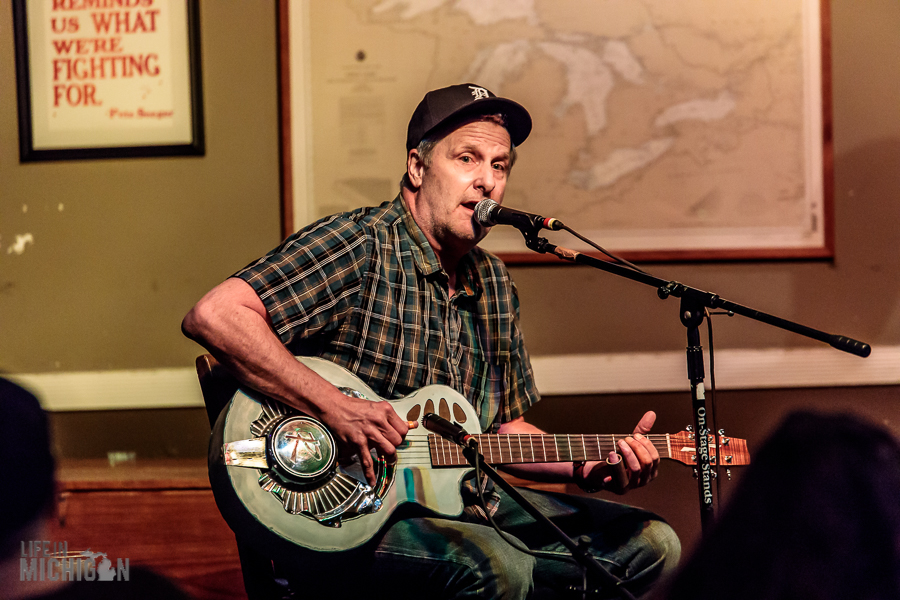
It was a sunny afternoon in late April, and as I sat across from Jeff Daniels in the room above his Chelsea recording studio, the sounds of a band practicing below drifted up the stairs, permeating the room with the intoxicating sounds of a particularly tight jam session. (Perhaps it was son Ben's band?)
Daniels is a busy man, but on this day he looked relaxed. He just wrapped-up a series of three sold-out, word-of-mouth concerts at the Chelsea Alehouse, each one drawing a bigger crowd than the last. For loyal patrons of the popular Chelsea watering hole, it was an irresistible opportunity to experience another side of a renowned local talent in a cozy, intimate setting.
For those unfamiliar with the musical side of Daniels' career, there's a distinctive streak of Americana to it -- or as he put in on that crowded Saturday night, "Whatever it is that I do up here." A self-taught musician with a playful sense of humor on stage, the actor-cum-musician fuses folk, blues, and country with a talent for telling particularly vivid, often hilarious, tales.
Though his formidable guitar skills give him the distinction of being a musician, his well-honed talent for holding an audience rapt reveals him to be -- as his other endeavors on stage and screen suggest -- a natural-born storyteller.
As is the case with his play and film Escanaba in da Moonlight, there's an unmistakable aspect of cultural preservation to Daniels' music. Songs like "Big Bay Shuffle" and "Michigan, My Michigan" display a deep-rooted desire share his personal experiences with the world at large.
Meanwhile, his distinctive fingerpicking style -- perfected with years of practice and occasional lessons from talented friends like Keb' Mo' -- can range from delicate and unobtrusive in his more introspective songs, to outright rollicking when he decides the room could use a bit more energy.
Though focused intently on editing a video when I first arrived, Daniels was quick to change gears once we sat on opposite ends of his fluffy studio couch. With the songs from the Saturday night show still ringing in my head, I was particularly eager to learn what inspires the esteemed actor as a musician and discover his secrets for engaging an audience when there's no safety net or script to follow.
AAFF 2017 | Interview with Leslie Raymond, Executive Director
The 55th Ann Arbor Film Festival gets underway Tuesday, March 21, and as artists and film lovers from around the globe prepare to descend upon the Michigan Theater for six days of mind-expanding cinema, Executive Director Leslie Raymond is on a mission to take the country's longest-running avant-garde and experimental film festival back to its all-inclusive roots.
Founded by George Manupelli in 1963, the AAFF has seen its share of shake-ups over the course of the past decade. From the AAFF v. State of Michigan lawsuit that resulted in part from the controversy that erupted over Crispin Glover's award-winning 2005 feature What Is It? to the departure of Program Director David Dinnell last year, Raymond no-doubt had her work cut out for her when she stepped into this pivotal role.
Fortunately for filmmakers and audiences alike, Raymond was no stranger to either the festival or Manupelli's original vision for it as a place where all voices and perspectives are celebrated. Twenty-five years ago, Raymond began her decades-long relationship with the AAFF as an intern under Program Director Vicki Honeyman, whose enduring 14-year run with the festival was longest anyone has served in such capacity other than the founder.
To take the reigns of a festival as celebrated and prestigious as the AAFF requires genuine dedication, and as anyone familiar with Raymond's impassioned 2009 blog post lamenting the "specialized, themed-programming" that had become a primary focus of the festival during that era, there was little question as to where her loyalties lied.
Flash forward eight years, and Raymond is now in the unique position of being able to turn those criticisms into concrete action. Raymond's deep respect for Manupelli's original vision is evident when listening to her speak about her late friend and the festival he conceived, and together with new Associate Director of Programs Katie McGowan, the executive director is on a mission to steer this ship back on course.
With Ann Arbor still recovering from the devastating windstorm dubbed the "largest combined statewide event in history" by Gov. Rick Snyder less than a week before the Opening Night Reception, Raymond was kind enough to take the time out from her hectic schedule to discuss these issues and more with Pulp.


